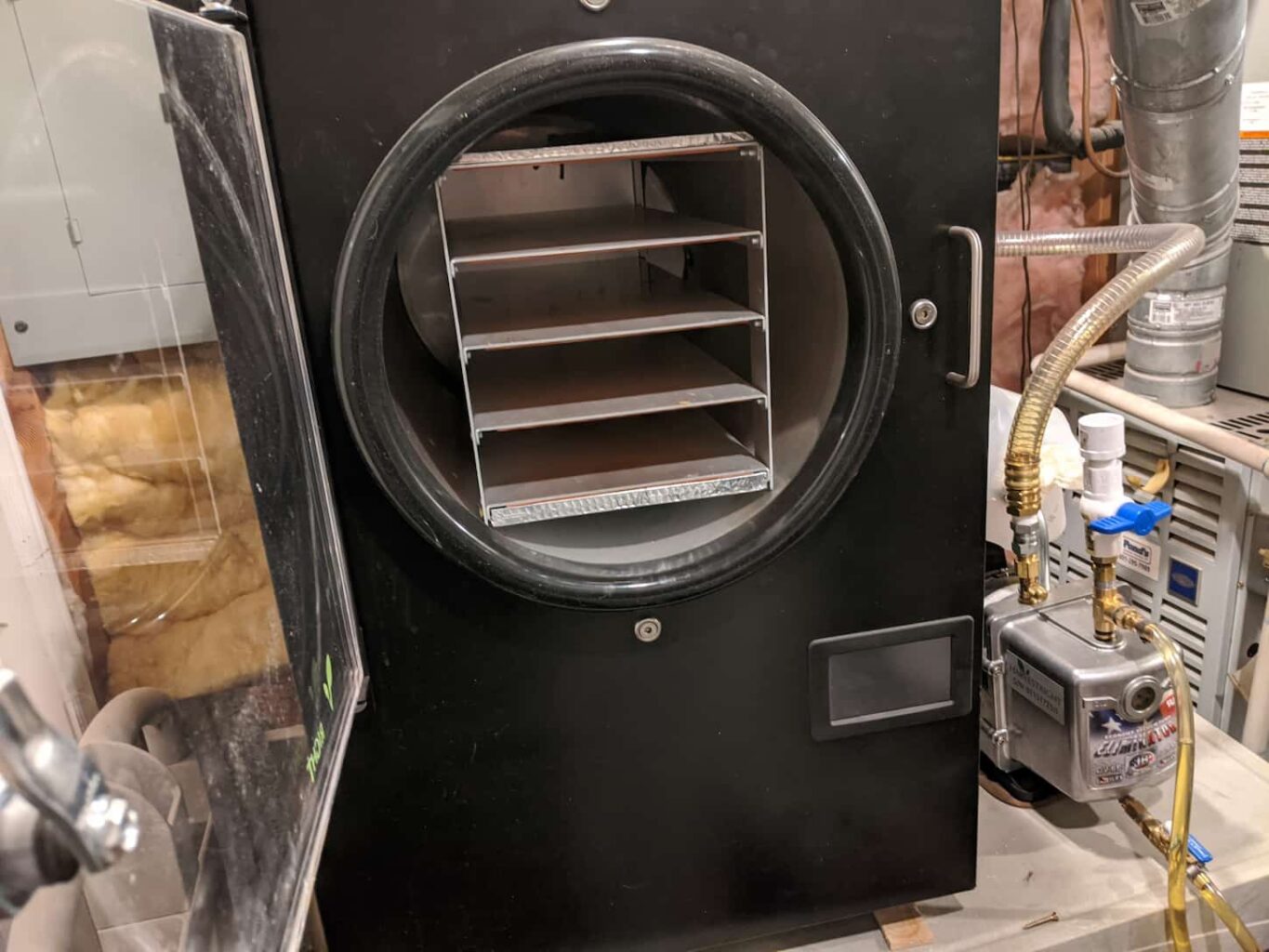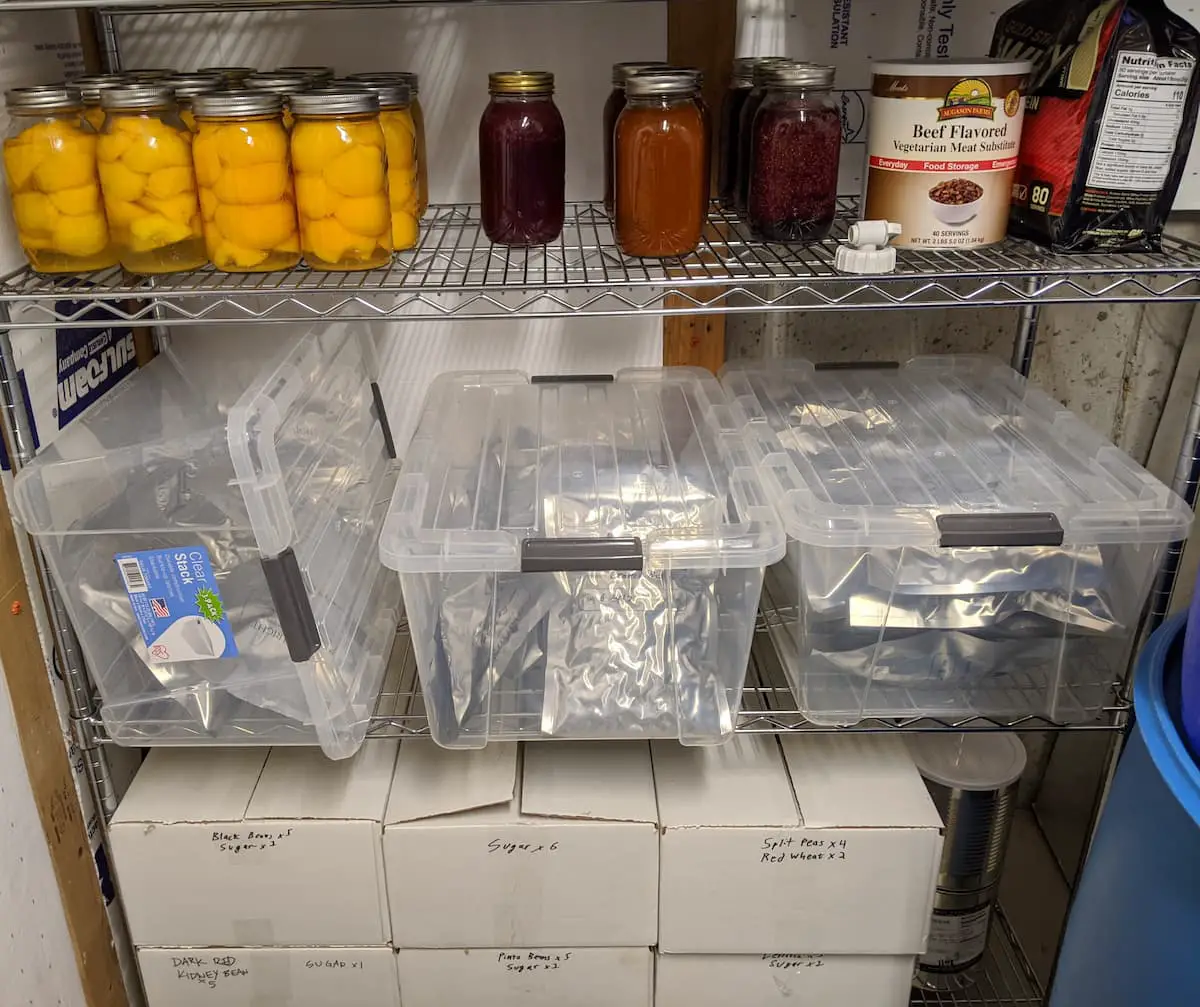How do freeze-dryers affect the environment surrounding us? Of course, we know how they affect the foods we make with them, but we also should understand how they affect our living conditions. For example, do freeze-dryers affect the humidity or temperature of the room?
Freeze dryers should not make a room significantly hotter or more humid as long as the unit is set up and functioning properly, though it may warm up a room slightly. Freeze dryers undergo rigorous safety checks to ensure they are safe and risk-free in a home environment.
We’ll guide you on how freeze-dryers impact heat and humidity, regardless of whether we’re looking to buy or have already purchased a freeze-dryer. You will discover what causes heat and humidity in the room while freeze-drying. Read on for more information.

Does a Freeze-Dryer Running Make the Room More Humid?
Freeze dryers do not emit humidity, so they won’t make the room more humid. Freeze-dryers drain water into a bucket when defrosting. If the room temperature is warm enough, there is a chance that the water will evaporate, which can increase the room’s humidity.
In my experience, there’s no noticeable difference in humidity in the room where we keep our freeze-dryer, even after a defrost cycle.
After completing a batch of freeze-dried food, the freeze-dryer will require defrosting. The melted ice will drain from the machine; the easiest way to collect this liquid is in a bucket via the drainage tube. In a heated room, this water can evaporate and create humidity.
It’s common knowledge that boiling water will evaporate into steam, but water can evaporate when at room temperature naturally – it’s just slower.
Without getting into the science of everything, the top layer of water in the drain bucket will get warm and turn into vapor, which creates humidity.
We may never notice the humidity in a large room with a steady temperature. If the room is small or the temperature increases significantly, the room where the freeze-dryer is running will be more humid.
The primary way to prevent this is to empty the drainage bucket as soon as the defrosting process is complete.
Pro tip: if you keep your freeze-dryer in a room with a drain, it’s super easy to prevent the room from getting too humid, even if the room is warm after a defrost cycle. You can either empty the water directly into the drain or a bucket – and then pour the contents down the drain.
Our freeze dryer’s drain tube is too far from the drain (extending it would create a tripping hazard), so we empty the drain into a bucket. However, it’s only 2-3 steps from the bucket to the drain, so emptying it is pretty easy.
Does a Freeze-Dryer Running Make the Room Hotter?
As with most appliances, freeze-dryers emit heat when running; depending on the room’s size, ventilation, and temperature, this can make the room hotter. If there is a significant temperature change, it’s worth checking to see if the machine is functioning correctly.
In my experience, running a freeze dryer does heat up the room it’s in by a small but noticeable amount. It’s not unbearable, though, and is only by a few degrees (3-5°F) max, as long as the room is generally temperature controlled.
If the room the freeze-dryer is in is too hot, this may be due to the machine overheating, or it could be that the room it’s in is too small or poorly ventilated.
The more likely reason it would overheat has to do with the room’s size, ventilation, or regular temperature. That’s why keeping your freeze-dryer in the right room is important.
That being said, the unit itself could be the issue. Overheating isn’t a common issue with freeze-dryers, but it can happen if the vent air holes are blocked, preventing the device from adequately ventilating.
Be sure to make sure there is nothing obstructing airflow from the machine.
The pump that powers the freeze-dryer can also operate at a hot temperature, which could heat a room if it’s small and stuffy.
If you find that the pump is generating a surprising amount of heat and is impacting the room’s temperature, it might be worth having it serviced by a professional in case of an issue.
For more information about your freeze dryer’s vacuum pump, click here to read our full guide on them!
We recommend operating a freeze-dryer at Harvest Right’s recommendations, between 35-90°F. And really, 60-75°F is the ideal.
- Using a freeze-dryer at a higher or lower temperature is safe, but the batch time will increase significantly, and so will your power consumption. That can get expensive quickly!
- Also, regularly operating a freeze-dryer at an elevated temperature can damage the machine and result in expensive repairs or replacements.
Given the increased heatwaves in recent summers, it’s ideal for storing a freeze-dryer in a consistently cool room. Many owners keep freeze-dryers in their garages or basements. In addition, large rooms which are well ventilated are ideal for storing a freeze-dryer.
Are you struggling with the decision of where you should put a freeze-dryer? Check out this article we wrote for you: Where Should You Put a Freeze-Dryer? Garage/Shop/Room.
If there aren’t any large spaces, prioritize a room that gets good ventilation or is often in the shade, meaning it doesn’t get too warm during the summertime. It’s important to remember that in high or low temperatures, a freeze-dryer will need to work harder.
This can mean longer batch times and higher energy consumption to produce the same results.

Key Takeaways and Next Steps
As outlined above, a freeze dryer’s impact on a room’s humidity and heat is minimal when operating correctly in the ideal environment. To avoid issues, follow the instruction manual and online resources to set up the machine correctly in the right place.
Changes in the heat and humidity in the freeze-drying room can result from several factors. After following our guidance and eliminating all the apparent causes, contact the manufacturer’s customer service department for professional advice.
Be sure to stop using the freeze-dryer immediately if there is any concern about its heat or humidity output. Hopefully, this article has answered all your questions, with a better understanding of freeze-dryers and how to adjust the environment for the best results.
If you want as much information as possible and want to read more about freeze-drying, check out these important pieces of information we’ve written for you.
- Can You Run a Freeze-Dryer on Solar Power?
- Can You Use Parchment Paper in a Freeze-Dryer?
- Do Freeze-Dryers Use a Lot of Electricity?
- Does Freeze-Drying Foods Kill It? (Bacteria, Virus, Nutrients, Enzymes)
- The Advantages and Disadvantages of Home Freeze-Drying
They’re all good reads, so pick your adventure – and know we’ve got you covered with all sorts of answers in the freeze-drying section of our site. On the off-chance that we don’t have your question covered – contact us! We’d love to fix that ASAP and help you out.
Resources
Learning from your own experience is essential, but learning from others is also intelligent. These are the sources used in this article and our research to be more informed as homesteaders.
- Far too many hours were spent running our freeze-dryer to find out this information, as well as far too many hours spent reading the owner’s manual like it was Harry Potter.
- “Might Be a Dumb Question but Is the Vacuum Pump Supposed to Run during the Entire Drying Process? Worried about It Overheating.” Reddit, 8 Nov. 2021. www.reddit.com/r/HarvestRight/comments/qp25d9/might_be_a_dumb_question_but_is_the_vacuum_pump.
- Utah State University. “Buying a Home Freeze-Dryer: What to Know Before You Go.” USU, 3 May 2022, extension.usu.edu/preserve-the-harvest/research/buying-a-home-freeze-dryer-what-to-know-before-you-go.
